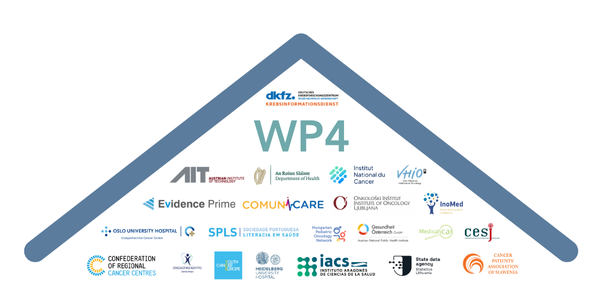At a glance
WP4 aims to produce high-quality content for the EU-CIP Library of Content and its preparation for publication on the different national EU-CIP websites.

This work package is led by DKFZ and contributed to by AIT, GOEG, BOCOC, IACS, VHIO, HUPON, DoHIE, CESJ, LSMU, LSDA, LIH, INC, CRIHM, OUS, SPLS, YCE, INOMED, cRCCS, OIL, CPAS, MESC.
The task
WP4 produce the EU-CIP Library of Content and will prepare it for publication on the different national EU-CIP websites. The content created will include texts, infographics and short videos covering the most important topics for cancer patients and their families during the patient journey. The content will be easy to understand and will meet the information needs of patients.
The information will cover the main types of cancer and address all stages from prevention and early detection to diagnosis and treatment. The selected cancer types meet the following criteria:
- Cancers with a high incidence of >25 per 100,000 in the participating European countries
- Cancers with a five-year survival rate of less than 50 percent and an incidence of >6 per 100,000
- The most common paediatric cancers
In addition to cancer type specific content, various aspects of life with and after cancer will be highlighted: Psychosocial, socio-legal issues as well as ways to take action yourself, such as diet or exercise.
All information is based on current evidence as summarised in the medical guidelines. The workflow of information research, collation and elaboration will be supported by an AI-LLM, which will be developed and validated in the course of the project in this work package.
A highly qualified Content Editorial Board and a Content Creation Group of health care professionals and health communication experts work closely with patient representatives. The task of these groups is to check the prototype content after AI-supported translation into the respective national languages and to adapt it to the respective healthcare systems prior to publication on the national EU-CIP websites.
The use of the EU-CIP websites will be supported by an AI conversational assistant, which is also being developed in this work package and evaluated in terms of quality..
